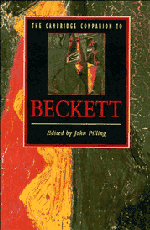Book contents
- Frontmatter
- 1 An endgame of aesthetics
- 2 Beckett's English fiction
- 3 Three novels and four nouvelles
- 4 Waiting for Godot and Endgame
- 5 Stages of identity
- 6 Beginning again
- 7 The mediated Quixote
- 8 Dead heads
- 9 Disabled figures
- 10 Beckett's poems and verse translations or
- 11 Beckett as director
- 12 Beckett's bilingualism
- 13 Beckett and the philosophers
- Further reading
- Index
3 - Three novels and four nouvelles
giving up the ghost be born at last
Published online by Cambridge University Press: 28 May 2006
- Frontmatter
- 1 An endgame of aesthetics
- 2 Beckett's English fiction
- 3 Three novels and four nouvelles
- 4 Waiting for Godot and Endgame
- 5 Stages of identity
- 6 Beginning again
- 7 The mediated Quixote
- 8 Dead heads
- 9 Disabled figures
- 10 Beckett's poems and verse translations or
- 11 Beckett as director
- 12 Beckett's bilingualism
- 13 Beckett and the philosophers
- Further reading
- Index
Summary
I’m locked up, I’m in something, it’s not I.
The UnnambleIf Beckett had written no other works than the four nouvelles and the 'trilogy' of novels, these alone would have secured for him in this century the eminence won in earlier times by Dante for the Divine comedy, by Milton for Paradise lost, and by Goethe for Faust. Those works expressed the unspoken consciousness of their age as Beckett's trilogy speaks to ours. They all describe a borderline between the salvation of an epoch and its destruction. Beckett's fictions confront a civilization which is the theatre of (amongst other things) a conflict between two powerful forces. One is the rationalizing) principle, cogito, abstract reasoning, the conscious mind, will and design, determinism, positivism, the imposition of extrinsic order.
Beneath, above and against this force, is the opposite force, often hidden, as yet inaccessible to conscious will: a sense of the primordial spring of life, which does not respond to analysis; the stream of which the archetypes are the only fit indicators; the mystery of birth and death, of which biology illustrates only the grossest mechanism; the actual unfoldment of existence, that is, something which we know, as living beings, but which is beyond our powers of comprehension. Its expression can only be in organic or symbolic forms; for instance, the life principle can only be experienced in its becoming, manifesting as, human, animal or plant, but not as a concept or structure of ideas. In psychology, this force was the province of Jung’s theory. Its world-view is the synergetic, integral or holistic. Its philosophy is the esoteric tradition. Jung’s understanding of the unconscious saw it as empowering the whole cosmos, whereas Freud's reduced the unconscious to the individual alone.
- Type
- Chapter
- Information
- The Cambridge Companion to Beckett , pp. 43 - 66Publisher: Cambridge University PressPrint publication year: 1994
- 1
- Cited by



